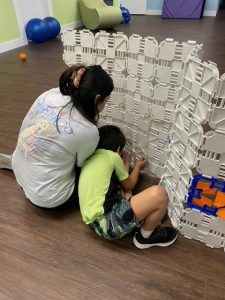Raising an autistic child can have its challenges, but with the right strategies in place, you can support your child’s development and foster their independence. By understanding the needs of a child with autism, you can create a safe and supportive environment for them to thrive. We’ll be discussing how to develop a child’s independence through the use of positive reinforcement, structure, and independence-building activities. So, let’s get started on the journey of helping your child with autism become more independent!
Setting Realistic Goals
Setting realistic goals is a crucial aspect of fostering independence in children with autism. It’s important to understand your child’s strengths, abilities, and limitations in order to create goals attainable and meaningful to them. When setting goals, it’s essential to consider their age, developmental stage, and individual interests.
One approach to setting realistic goals is to break them down into smaller, manageable steps. For example, if the ultimate goal is for your child to dress themselves independently, start by focusing on one specific aspect, such as putting on their shoes or buttoning their shirt. Celebrate each small achievement along the way to keep them motivated and encouraged.
Another important aspect of setting realistic goals is to take into account any sensory or communication challenges your child may have. For instance, if your child is sensitive to certain textures, it may be unrealistic to expect them to eat a wide variety of foods. Instead, focus on gradually introducing new textures or incorporating foods with similar textures into their diet.
Remember that every child is unique and may progress at their own pace. It’s important to be patient and flexible in your approach to goal-setting.
Related Post: What is an IEP and How Does Your Child Benefit From Having One?
Encouraging Self-Care Skills
Encouraging self-care skills is an important part of fostering independence in children with autism. These skills not only help them become more self-sufficient but also build their confidence and sense of autonomy.
One way to encourage self-care skills is by creating a visual schedule or checklist. This can help your child understand and remember the steps involved in tasks such as brushing their teeth, getting dressed, or taking a bath. Use pictures or symbols that they can easily recognize and follow along with. Break down each task into smaller, manageable steps to make it less overwhelming for them.
Modeling the behavior and providing verbal prompts can also be helpful. Show your child how to do a task step by step, and then ask them to try it themselves. Give them positive reinforcement and praise their efforts, even if they don’t get it right the first time. Encourage them to ask for help if they need it, but also give them space to try things on their own.
Creating a sensory-friendly environment can also support self-care skills. For children with autism, certain sensory experiences can be overwhelming or uncomfortable. Consider their sensory preferences and sensitivities when choosing materials or products for self-care tasks. For example, if your child is sensitive to certain fabrics, opt for soft, comfortable clothing options. If they have difficulty with brushing their teeth, try different toothpaste flavors or textures to find one that they prefer.
Developing Life Skills
Life skills encompass a wide range of abilities essential for daily living, such as cooking, cleaning, managing money, and transportation. By teaching and reinforcing these skills, you can empower your child to become more self-reliant and capable of navigating the world around them.
When developing life skills, it’s important to take a gradual and systematic approach. Start by identifying the specific skills most relevant and meaningful to your child’s age and stage of development. Break each skill down into smaller, manageable steps, and provide clear and concise instructions. Use visual supports, such as pictures or written instructions, to aid comprehension and reinforce learning.
Create opportunities for your child to practice and apply these skills in real-life situations. For example, involve them in meal planning and grocery shopping to teach them about healthy eating and budgeting. Allow them to take responsibility for household chores, such as doing laundry or tidying up their room. Encourage them to participate in community activities, such as volunteering or joining a sports team, to develop social and teamwork skills.
As your child becomes more proficient in these life skills, gradually increase the complexity and independence level of the tasks. Provide feedback and praise for their efforts, focusing on their progress rather than perfection. It’s important to be patient and supportive, allowing your child to learn and grow at their own pace.
Creating a Structured Routine
Establishing a consistent daily schedule can provide predictability and a sense of security for your child. This can help them understand what is expected of them and reduce anxiety and meltdowns.
When creating a structured routine, include specific times for different activities, such as meals, playtime, and homework. This can help your child transition smoothly from one activity to another and feel more in control of their day. Use visual supports such as a visual schedule or a visual timer to make the routine more tangible and easier for your child to understand.
It’s also beneficial to include activities that your child enjoys and finds motivating. This can help increase their engagement and cooperation throughout the day. For example, if your child loves playing with Legos, incorporate a designated time for Lego building into their routine. This can give them something to look forward to and provide a sense of motivation to complete other tasks.
Keep in mind that flexibility is key when creating a structured routine. While it’s important to have a general structure, allow for some flexibility and spontaneity within the schedule. This can help accommodate unexpected events or changes in your child’s needs or interests.
Encouraging Social Interactions
Building and maintaining meaningful relationships with others can enhance their communication skills, self-confidence, and overall well-being. Here are some strategies to encourage social interactions for your child:
1. Provide opportunities for socializing: Arrange playdates, join social groups, or participate in community events that align with your child’s interests. This will help them engage with peers and develop important social skills.
2. Teach social skills: Break down social skills into manageable steps and provide explicit instruction and modeling. Focus on skills like greeting others, taking turns, sharing, and initiating conversations. Practice these skills in a variety of settings to help your child generalize them.
3. Use visual supports: Visual supports, such as social stories or visual schedules, can help your child understand social expectations and navigate social situations. Use pictures or symbols to reinforce the steps involved in different social interactions.
4. Role-play: Engage in pretend play or role-playing activities where you can act out social scenarios with your child. This will provide them with an opportunity to practice social skills in a safe and supportive environment.
5. Reinforce positive social behaviors: Provide specific and immediate praise when your child demonstrates positive social behaviors, such as sharing or taking turns. This will motivate them to continue engaging in these behaviors.
Remember that every child is unique, and their social development may progress at their own pace. Be patient, celebrate small successes, and provide ongoing support to help your child thrive socially.
Utilizing Assistive Technology and Visual Supports
Utilizing assistive technology and visual supports can be incredibly beneficial for children with autism, as it can enhance their communication skills, support their learning, and promote their independence. Assistive technology refers to any device or tool that helps individuals with disabilities overcome challenges and accomplish tasks. For children with autism, this can include communication apps or devices, visual schedules, timers, and sensory aids.
Visual supports, such as visual schedules or social stories, can help children with autism understand and follow daily routines, navigate social situations, and comprehend expectations. These visual aids provide a tangible and structured way for children to process information and improve their understanding of the world around them.
It’s important to remember that the selection and implementation of assistive technology and visual supports should be done in collaboration with professionals, such as speech therapists or occupational therapists, who can provide guidance and recommendations based on your child’s specific needs. Together, you can identify the most effective tools and strategies to support your child’s development and independence.
Related Post: Maximizing Your Child’s Comfort: The Importance of a Sensory Backpack for Autism
Celebrating Achievements and Practicing Patience
As parents, it’s important to celebrate every achievement, no matter how small, that your child with autism makes on their journey toward independence. Recognizing their progress and acknowledging their efforts can boost their self-esteem and motivation. Remember, each milestone reached is a significant step forward and should be celebrated accordingly.
It’s crucial to practice patience when supporting your child’s development. Embrace the process and focus on the growth and improvements your child is making rather than comparing them to others. Allow them the time they need to learn and develop skills and provide ongoing support and encouragement along the way.
Be patient with yourself as well. Parenting a child with autism can be challenging, and there will inevitably be moments of frustration and exhaustion. Give yourself permission to take breaks, seek support from others, and practice self-care. Remember, you’re doing your best, and your love and dedication to your child are what truly matter.
So, as you celebrate your child’s achievements, both big and small, and practice patience on this journey, know that you are making a significant difference in their life. Your unwavering support and belief in their abilities will empower them to reach their fullest potential and become the independent individuals they are meant to be.
Autism Therapy in Springfield and Joplin
My World ABA provides ABA therapy in Joplin and Springfield, MO. Our approach is based on kindness and understanding, and we strive to create a fun and inclusive environment where your child will feel welcome.
To learn more about our services or answer additional questions, visit our website or call (417) 818-5784 today.





